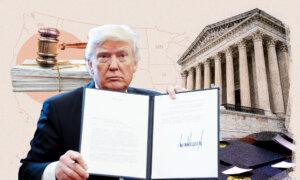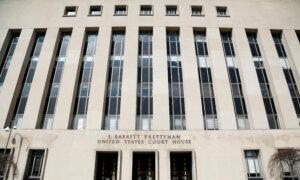The bill seeks to limit injunctive relief to parties before the court.
Senate Judiciary Chair Chuck Grassley (R-Iowa) introduced legislation on March 31 to prevent courts from issuing nationwide injunctions.
Dubbed the Judicial Relief Clarification Act of 2025, the law comes amid heightened scrutiny over the use of nationwide injunctions and their increasing role in halting aspects of President Donald Trump’s agenda.
The law would amend two other laws—the Administrative Procedure Act and the Declaratory Judgment Act—to limit the scope of relief courts are authorized to offer under statutes.
Nationwide injunctions have been the subject of debate, including whether Article III of the Constitution authorizes their use.
That provision vests judicial power in the courts and generally gives them authority over “cases” and “controversies.”
“Article III of the Constitution tasks the judicial branch with resolving ‘cases’ and ’controversies,’ not making policy,” he said.
“The obvious solution is to limit district courts to resolving the cases only between the parties before them.”
Most come from judges appointed by a president from the opposing party to the one in the White House.
The trend, the study said, has been fueled by “judge shopping,” the practice of strategically filing lawsuits before judges whom plaintiffs view as more favorable to their cases.
Presidents George W. Bush and Barack Obama saw six and 12 universal injunctions, respectively, during their terms.
In Trump’s first term, that number increased to 64, of which 59 came from a judge appointed by a president of the opposing party.
Trump recently denounced their use and asked the Supreme Court to intervene.
Judges have defended the broad scope of the injunctions, saying they’re necessary to avoid purported harms resulting from executive action.
“The reason the executive orders are unconstitutional—namely that, at minimum, they violate the separation of powers—are applicable to jurisdictions throughout the country,” U.S. District Judge Brendan Hurson said in February while blocking Trump’s order on “gender-affirming care.”
“The necessity of a nationwide injunction is underscored by the fact that hospitals all over the country could lose access to all federal funding if they continue to provide gender-affirming medical care.”
In issuing a preliminary injunction on Trump’s birthright citizenship order, U.S. District Judge John Coughenour said in February that a geographically limited injunction would be “ineffective” because plaintiff states would have to pay for the children of illegal immigrants who travel from other states.
“Universal injunctions have reached epidemic proportions since the start of the current administration,” Harris said.
She also said that “only [the Supreme Court’s] intervention can prevent universal injunctions from becoming universally acceptable.”
It’s unclear how the Supreme Court will rule or what kinds of challenges Grassley’s legislation may face in the courts.
While speaking at Northwestern University’s law school in 2022, Justice Elena Kagan said, “It just can’t be right that one district judge can stop a nationwide policy in its tracks and leave it stopped for the years that it takes to go through the normal process.”
Meanwhile, Justice Sonia Sotomayor backed a nationwide injunction issued against Trump’s travel ban.
“The District Court did not abuse its discretion by granting nationwide relief,” she said, before noting “unique circumstances” in the case.
Washington and Lee University Law School professor Doug Rendleman cited Sotomayor’s opinion while defending the use of nationwide injunctions.
“A nationwide national government injunction may be the only way to extend complete relief to plaintiffs, protect their entitlements, and … avoid illegal or unconstitutional government policies that harm thousands of others.”
Original News Source Link – Epoch Times
Running For Office? Conservative Campaign Consulting – Election Day Strategies!


